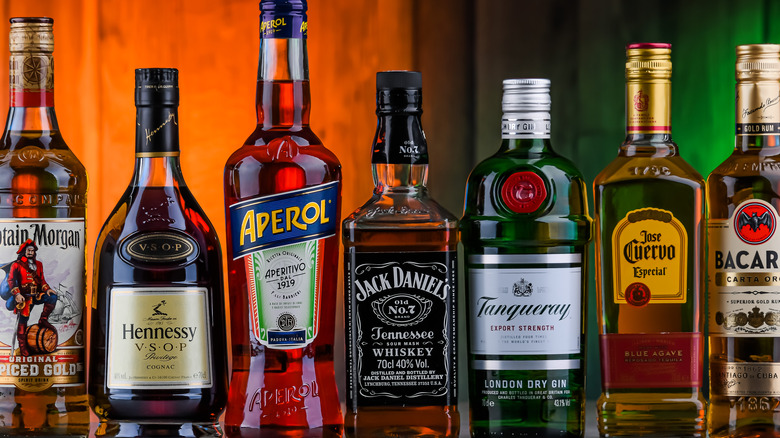
Liquor, a distilled alcoholic beverage, has played a central role in human culture, economy, and social life for centuries. From ancient civilizations to the modern era, it has evolved from being a sacred substance used in rituals to a key player in global trade and 威士忌 gatherings. While liquor is celebrated for its ability to bring people together and mark significant moments, it also carries a legacy of controversy due to its health effects and its role in addiction. This article explores liquor’s multifaceted impact on culture, economy, health, and modern social dynamics.
The history of liquor dates back to ancient Mesopotamia and Egypt, where fermented beverages were consumed in religious rituals and as offerings to gods. With the advent of distillation techniques, civilizations began producing stronger alcoholic drinks, transforming liquor from a ceremonial beverage into a commodity. In the middle Ages, monasteries in Europe played a crucial role in refining distillation methods, leading to the creation of spirits like whiskey and brandy. By the time of the age of Exploration, liquor had become a significant trade item, contributing to colonial expansion and the exchange of cultures between continents.
Liquor production and consumption have had a massive economic impact over the centuries. Today, the global liquor industry is worth billions, with spirits like whiskey, vodka, rum, and tequila being top exports for several countries. Liquor brands have become symbols of national pride, particularly in regions like Scotland (whiskey), Russia (vodka), and Mexico (tequila). As countries increasingly embrace globalization, liquor markets have expanded, with craft distilleries gaining popularity for offering unique, locally produced options. These enterprises generate employment and stimulate tourism, especially in regions with renowned liquor production traditions.
However, the economic success of the liquor industry comes with a social cost. Alcohol abuse is a global issue, with millions of people suffering from addiction and its associated health complications. Excessive liquor consumption can lead to liver disease, cardiovascular issues, and mental health problems, placing a significant burden on healthcare systems worldwide. Governments have attempted to regulate liquor sales through taxes, age restrictions, and public health campaigns, but the challenge of curbing alcohol abuse while maintaining a lucrative industry remains complex.
In many cultures, liquor is associated with celebrations, rituals, and social bonding. Whether it’s a champagne toast at a wedding or sharing a glass of whiskey with friends, liquor often symbolizes moments of joy, success, or camaraderie. This social aspect of drinking has made liquor a staple in events ranging from casual gatherings to formal occasions. However, there is a fine line between social drinking and overconsumption, with many societies grappling with how to promote responsible drinking without dampening its cultural significance.
The role of liquor in modern society is also influenced by evolving trends and consumer preferences. The rise of health-conscious movements has led to a shift in drinking habits, with consumers seeking lower-calorie options, organic spirits, and alcohol-free alternatives. Additionally, younger generations, particularly millennials and Gen Z, are more likely to prioritize wellness, leading to a decline in heavy drinking and a preference for moderation. This shift has prompted liquor companies to innovate, creating products that cater to these changing tastes while still maintaining the allure of traditional spirits.
Liquor also plays a significant role in shaping local economies through tourism. Many countries, such as Scotland, Ireland, and Japan, have developed robust liquor tourism industries, inviting visitors to explore distilleries, learn about the production process, and sample local products. These experiences not only promote national heritage but also boost local economies by attracting international travelers and creating jobs in the hospitality and service sectors. Liquor tourism also fosters a deeper appreciation of the cultural and historical importance of spirits in different regions.
Despite its cultural significance, liquor has been a subject of controversy, particularly in societies where religious or moral values oppose its consumption. In many Islamic countries, alcohol is either strictly regulated or banned altogether due to religious teachings. In other regions, temperance movements have advocated for the prohibition of liquor, citing its negative effects on individuals and communities. The most notable example is the Prohibition era in the united states, which lasted from 1920 to 1933, where the sale, production, and transportation of alcohol were banned. The period led to the rise of illegal speakeasies and organized crime but also sparked debates about personal freedom and the role of government in regulating individual behavior.
Today, liquor continues to be a central part of global trade and diplomacy. Countries often use it as a tool for strengthening diplomatic ties, offering local spirits as gifts during state visits and international meetings. The liquor industry also plays a role in global branding, with certain brands becoming synonymous with luxury and prestige. This has led to the creation of exclusive, limited-edition spirits that are highly sought after by collectors and connoisseurs. The marketing of these high-end products highlights liquor’s status as not only a beverage but also a symbol of wealth and sophistication.
As liquor remains a powerful force in both culture and commerce, it also raises important ethical questions about responsibility. Governments, corporations, and consumers must work together to strike a balance between enjoying liquor’s cultural and social benefits while addressing its potential harms. Public health initiatives, stricter regulations on marketing, and better education about responsible drinking can all contribute to reducing alcohol-related problems without diminishing the positive aspects of liquor in society.
In conclusion, liquor is more than just a beverage; it is an integral part of human history, culture, and economy. Its influence spans centuries and continents, shaping everything from ancient rituals to modern-day celebrations. While it brings people together and contributes to economic growth, it also poses challenges related to health and social welfare. Navigating these complexities requires a nuanced approach, one that respects liquor’s cultural significance while promoting responsible consumption for the betterment of individuals and communities.